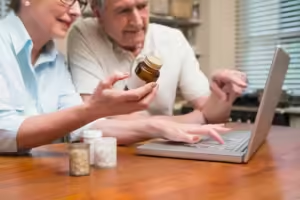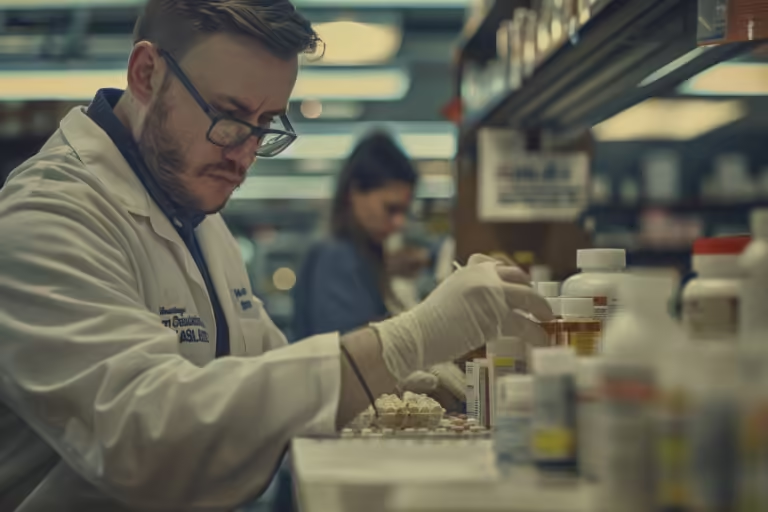Did you know that 16.8% of U.S. patients are exposed to multiple drugs with available pharmacogenomic guidelines1? This statistic highlights the pivotal role of pharmacogenomics in contemporary healthcare, particularly for the elderly. We will delve into how genetic insights are transforming drug treatments for seniors, marking a significant shift towards personalized medicine.

Pharmacogenomics, the study of how genes influence drug responses, is transforming geriatric care. By deciphering the genetic impact on medications, healthcare professionals can provide more precise treatments. This could potentially decrease hospitalizations and emergency visits2. Given the complexities of drug metabolism in older adults, this tailored approach is especially crucial.
The advantages of pharmacogenomic testing in elderly care are considerable. Research indicates a 11.3% median reduction in annual healthcare costs for elderly patients on multiple medications1. Furthermore, this personalized method has shown a 17% improvement in outcomes for antidepressants and antipsychotics when genetic testing is conducted1.
As we age, our drug metabolism undergoes significant changes. Pharmacogenomics addresses these shifts, ensuring that seniors receive the appropriate medication at the correct dosage. This targeted approach not only boosts treatment efficacy but also dramatically lowers the risk of adverse drug reactions, a significant concern in geriatric care.
The trajectory of elderly care is towards utilizing genetic variants to inform drug therapy. With ongoing research and legislative support, such as the Right Drug Dose Now Act, we are moving towards a healthcare paradigm where personalized medicine is the standard, not the exception2. As we further explore the intricacies of pharmacogenomics and aging, we are creating a future where treatments are safer and more effective for our golden years.
Introduction to Pharmacogenomics in Geriatric Care
Pharmacogenomics heralds a paradigm shift in geriatric pharmacotherapy, merging genetics with drug response to forge personalized medicine for the elderly. This necessity is underscored by the staggering financial burden of falls on the U.S. healthcare system, estimated in the billions annually, and their status as a leading cause of injury deaths globally3.
Defining Pharmacogenomics
Pharmacogenomics delves into the intricate relationship between genes and drug responses, striving to craft medications that resonate with an individual’s genetic profile. This discipline is paramount for seniors, who frequently grapple with multiple health conditions and a plethora of medications.
The Importance of Personalized Medicine for Older Adults
Personalized medicine emerges as a cornerstone for seniors, mitigating adverse drug reactions and enhancing treatment efficacy. Pharmacogenomic testing emerges as a pivotal tool, pinpointing medications that heighten fall risk, thereby facilitating safer prescription regimens. This strategy could potentially curtail the alarming rate of falls among U.S. seniors, occurring every second3.
Current Challenges in Geriatric Pharmacotherapy
Geriatric pharmacotherapy confronts a myriad of challenges:
- Polypharmacy (use of multiple medications)
- Altered drug metabolism in older bodies
- Increased risk of adverse drug reactions
- Underrepresentation in clinical trials
Notably, Hispanic/Latino and African American populations, despite being at heightened risk for adverse outcomes with certain medications, are frequently underrepresented in drug trials4. This disparity underscores the imperative for pharmacogenomic research that is inclusive, ensuring safe and effective treatments for all seniors.
| Challenge | Impact | Pharmacogenomic Solution |
|---|---|---|
| Polypharmacy | Increased risk of drug interactions | Personalized drug selection |
| Altered metabolism | Unpredictable drug responses | Genetic-based dosing |
| Adverse reactions | Health complications, falls | Identification of high-risk medications |
By tackling these challenges through pharmacogenomics, we can deepen our understanding of drug-gene interactions and elevate the efficacy of geriatric pharmacotherapy.
The Science Behind Pharmacogenomics and Aging
Pharmacogenomics is pivotal in elucidating the interplay between genetic variations and drug responses, particularly in the elderly. As aging progresses, physiological changes significantly alter drug metabolism and efficacy. This field is especially critical for the elderly, where polypharmacy is prevalent.
Research indicates that polypharmacy, characterized by the regular consumption of five or more medications, affects 30% to 55% of older adults5. In a cohort of patients aged 65 and above, 83% were found to be taking five or more medications, with 43% consuming ten or more6. These figures underscore the intricate nature of medication management in seniors.
Genetic polymorphisms profoundly influence drug metabolism and pharmacokinetics in the elderly. Over 90% of individuals harbor at least one genetic variant that could influence prescribing decisions6. This genetic heterogeneity elucidates why some seniors experience adverse drug reactions, while others do not, despite identical medication regimens.
The effect of genetic variations on drug efficacy is evident in widespread medications. Between 1.0% and 1.4% of prescriptions for patients aged 65 and over were for clopidogrel and warfarin, drugs with known pharmacogenomic associations6. Grasping these genetic factors can avert adverse drug reactions, which are responsible for 1 in 5 hospital admissions of patients over 656.
As the aging population expands, with projections indicating that by 2050, one in four individuals in the UK will be 65 or older, the significance of pharmacogenomics in geriatric care becomes increasingly evident6. By incorporating genetic testing into routine care, healthcare professionals can refine drug therapies, diminishing the risk of adverse reactions and enhancing treatment outcomes for our seniors.
Genetic Variants Affecting Drug Metabolism in Older Adults
Genetic variants are pivotal in drug metabolism, especially among the elderly. A comprehensive study of 60,706 individuals uncovered an average of 40.6 functional genetic variants per individual, directly influencing drug metabolism7. These genetic differences profoundly affect how older adults metabolize medications.
Common Genetic Polymorphisms in the Elderly
Genetic polymorphisms in drug-metabolizing enzymes are ubiquitous among the elderly. Research indicates that 98.7% of patients harbor at least one actionable genotype8. The cytochrome P450 enzymes, integral to drug metabolism, exhibit notably high polymorphism rates8.
Impact on Drug Efficacy and Toxicity
Genetic variations significantly alter drug efficacy and toxicity. A study revealed that rare variants account for 10.8% of functional genetic variants, contributing to over 90% of genetic variability in pharmacogenes7. This variability often results in unexpected drug responses among seniors.
Age-Related Changes in Pharmacokinetics and Pharmacodynamics
With age, drug processing in the body undergoes significant changes. There are 440 genetic variants that influence the pharmacokinetics and pharmacodynamics of drugs8. These alterations, coupled with genetic variations, elevate the risk of adverse drug reactions (ADRs). In fact, ADRs are the fourth leading cause of death in the USA9.
Grasping these genetic variants is essential for optimizing drug therapy in older adults. Healthcare providers must consider both genetic factors and age-related changes. This approach enables them to tailor treatments, reducing risks and enhancing outcomes for senior patients.
Pharmacogenomics and Aging: Tailoring Treatments for Seniors
Pharmacogenomics is revolutionizing geriatric care by introducing personalized medicine for seniors. This groundbreaking method integrates genetic factors and age-related modifications to refine drug selection and dosing10.
The necessity of tailored treatments for the elderly is underscored by the widespread issue of polypharmacy. The combination of multiple medications frequently results in adverse drug reactions, hospitalizations, and a diminished quality of life10. Through the analysis of an individual’s genetic profile, healthcare professionals can enhance drug efficacy and safety. This minimizes the risks linked to intricate medication regimens1011.
Pharmacogenomic testing is pivotal in crafting personalized treatment plans. It optimizes medication selection and dosing, leading to superior outcomes for seniors11. Research indicates that patients receiving pharmacogenomic-guided dosing exhibit higher response rates compared to conventional methods11.
- Predicts likelihood of severe side effects
- Enhances patient safety
- Reduces adverse drug reactions
- Lowers healthcare costs
Genes such as CYP2D6 and CYP2C19 are pivotal in drug metabolism, highlighting the imperative for validated testing protocols11. As pharmacogenomics research progresses, it refines medication protocols for seniors, ensuring more precise and individualized treatments10.
Pharmacogenomics is revolutionizing polypharmacy management in elderly patients, enhancing treatment efficacy and reducing associated risks.
By integrating genetic testing into clinical practice and developing decision support tools, healthcare providers can optimize geriatric care. This approach not only enhances treatment outcomes but also contributes to drug development and precision medicine advancements11.
Benefits of Personalized Medicine in Geriatric Care
Personalized medicine presents substantial benefits for the elderly, addressing the distinct challenges of geriatric care. With the global senior population expanding, tailoring treatments is essential for enhancing health outcomes.
Reducing Adverse Drug Reactions
Pharmacogenomic testing significantly minimizes adverse drug reactions in older patients. The Cleveland Clinic’s Pharmacogenomics Clinic has observed this testing’s efficacy, particularly in geriatric patients on multiple medications12. By identifying genetic variations influencing drug metabolism, physicians can adjust dosages or select alternative medications, thereby reducing the risk of harmful side effects.
Improving Treatment Efficacy
Personalized medicine significantly enhances treatment efficacy for seniors. A study demonstrated that preemptive pharmacogenetic testing in primary care could profoundly impact patient outcomes13. This method enables healthcare providers to select medications that align with a patient’s genetic profile, thereby increasing the likelihood of positive results.
Cost-effectiveness in Healthcare
Adopting personalized medicine can lead to cost savings in geriatric care. Pharmacogenomic testing, combined with drug-drug interaction data, has shown benefits in enhancing safety and quality of life for older patients14. By reducing adverse reactions and hospitalizations, this approach can lower overall healthcare costs for the aging population.
| Benefit | Impact |
|---|---|
| Reduced Adverse Reactions | Fewer hospitalizations and complications |
| Improved Treatment Efficacy | Better health outcomes and quality of life |
| Cost-effectiveness | Lower long-term healthcare expenses |
As personalized medicine gains traction, insurance companies are starting to recognize its value. United Healthcare now covers pharmacogenomics testing for certain conditions, signaling a shift towards broader acceptance of this approach in geriatric care12.
Implementing Pharmacogenomic Testing in Clinical Practice
Pharmacogenomic testing is transforming healthcare by personalizing treatments based on genetic profiles. Its clinical application holds great promise for enhancing patient care. Research indicates that 91%–99% of individuals possess at least one genotype influencing drug efficacy, with these drugs constituting up to 18% of all prescriptions15.
Genetic screening is pivotal in this transformation. It entails the analysis of a patient’s DNA to uncover specific genetic variations affecting drug responses. This knowledge empowers physicians to make more precise medication choices and dosages.

The effects of pharmacogenomic-guided therapy are profound. Patients treated according to their genetic profiles experience significantly fewer adverse drug reactions compared to those on conventional treatments (21% vs 27.7%)15. This method not only enhances patient outcomes but also yields substantial cost savings, potentially reaching up to $3,962 per patient annually15.
However, the integration of pharmacogenomic testing into clinical practice faces several challenges. These include standardizing procedures, ensuring test results are accessible, and developing adequate support systems for healthcare professionals. Limited expertise in interpreting test results and the absence of cost-effective tools hinder widespread adoption16.
To address these obstacles, researchers are investigating ways to integrate pharmacogenomic tests into clinical decision-making frameworks. This includes studies on specific medications and their genetic associations with adverse events16. The aim is to establish pharmacogenomic testing as a standard component of patient care, potentially reducing the 135,000 annual deaths in the USA due to adverse drug reactions17.
Challenges and Ethical Considerations in Geriatric Pharmacogenomics
Pharmacogenomics in geriatric care is advancing, yet ethical dilemmas arise. Privacy, informed consent, and equitable access to genetic testing are paramount. Grasping these challenges is essential for ethical implementation.
Privacy Concerns
Genetic data is highly sensitive. The digital transformation of healthcare heightens privacy concerns. Only 13% of physicians and 8% of hospitals in the United States have electronic health records18. This gap complicates the secure storage and sharing of genetic data.
Informed Consent in Older Populations
Securing informed consent from older adults is complex. Cognitive impairments can hinder their comprehension of genetic testing’s implications. With 49% of Italian patients over 65 receiving polypharmacy, the necessity for clear communication about pharmacogenomic benefits is underscored19. Healthcare providers must ensure patients fully understand the long-term implications of genetic testing.
Equitable Access to Genetic Testing
Ensuring fair access to pharmacogenomic testing is a significant challenge. The “treatment gap” for drug and alcohol treatment widened for most nonwhite racial/ethnic groups between 2002 and 200918. This disparity may extend to pharmacogenomic interventions. Financial barriers and healthcare disparities could restrict access to personalized medicine benefits.
To address these challenges, clear guidelines, provider education, and consideration of socioeconomic factors are necessary. By 2050, the global elderly population is projected to double, emphasizing the need for ethical pharmacogenomic implementation20. The balance between innovation and patient rights will define the future of personalized geriatric care.
Future Directions: Integrating Pharmacogenomics into Routine Elderly Care
The trajectory of pharmacogenomics in elderly care is optimistic, with precision medicine at its forefront. Sanford Health has administered pharmacogenomics testing to over 29,000 patients, illustrating the increasing acceptance of this methodology21. This integration heralds a new era of personalized and efficacious treatments for the elderly.
Pharmacogenomic testing has exhibited considerable efficacy in curtailing adverse drug reactions. Research indicates a 30% decrease in medication adverse events over a 12-week span21. This reduction is crucial for older adults, who frequently encounter complex medical conditions and multiple medications.
The realm of pharmacogenomics in elderly care is witnessing exponential growth. Currently, the FDA reports that over 175 medications include pharmacogenomics-related labeling information22. This expansion foretells a future where genetic data becomes integral to prescribing for seniors.
However, the integration of pharmacogenomics into routine elderly care encounters obstacles. A major hurdle is the development of IT solutions that seamlessly incorporate pharmacogenetic data into healthcare systems23. To overcome this, experts advocate for integrating pharmacogenetic information within existing Electronic Health Records, rather than through separate portals.
As the field progresses, we anticipate the advent of more extensive genetic panels and enhanced understanding of intricate gene-drug interactions. These advancements will significantly refine treatment precision for older adults, thereby enhancing their health outcomes and quality of life in their later years.
The Role of Healthcare Providers in Pharmacogenomic-Guided Therapy
Healthcare providers are pivotal in the advancement of pharmacogenomic-guided therapy, a domain experiencing rapid evolution. Family physicians, often the initial contact for patients with genetic inquiries, hold a significant role in this era of personalized medicine24.
The U.S. Food and Drug Administration (FDA) has acknowledged the significance of pharmacogenomics, with over 150 drugs now featuring pharmacogenetic information on their labels24. This emphasizes the escalating necessity for healthcare providers to grasp and apply genetic data in their prescribing choices.
Despite the escalating importance of pharmacogenomics, many primary care physicians express a lack of readiness to order or interpret genetic tests24. This underscores a critical educational need for pharmacogenomic knowledge among healthcare providers. Clinical decision support systems can fill this knowledge gap, facilitating the effective integration of genetic data into patient care.
The influence of pharmacogenomics on patient care is profound. For example, while 90% of patients metabolize codeine to morphine at expected rates, about 1-2% are ultrarapid metabolizers at risk of toxicity, and 5-10% are poor metabolizers who may not achieve adequate pain relief24. Such variations highlight the critical role of personalized medicine in enhancing patient outcomes and minimizing adverse drug reactions.
To fully leverage pharmacogenomics’ potential, healthcare providers must commit to ongoing education and training. This will empower them to confidently leverage genetic information to refine treatment plans, particularly for older adults who frequently have intricate medication regimens.
As pharmacogenomic testing expands to various health conditions, from cardiovascular disease to mental health disorders, healthcare providers must remain abreast of the latest advancements25. By doing so, they can deliver patients the most effective, tailored care in this new era of genomic medicine.
Patient Education: Empowering Seniors with Pharmacogenomic Knowledge
Patient education is paramount in empowering seniors with pharmacogenomic knowledge. As pharmacogenomics evolves, it is imperative to arm older adults with the capacity to make informed healthcare decisions. Adverse drug events are prevalent among seniors, with a substantial portion being preventable through education and genetic testing26.
Genetic literacy is fundamental to shared decision-making between patients and healthcare providers. Seniors, by grasping the basics of pharmacogenomics, can engage more effectively in discussions about their treatment options. Research highlights the challenges faced by low-income senior housing residents during care transitions, underscoring the necessity for targeted educational initiatives26. Healthcare professionals are thus developing educational materials that simplify complex genetic concepts for seniors.
The integration of pharmacogenomics in elderly care has yielded encouraging outcomes. A pharmacist-led service has shown cost avoidance in senior care programs, illustrating the value of incorporating genetic information into treatment plans27. Through patient education and genetic literacy, we empower seniors to pose informed questions about their medications and genetic influences on drug responses.
Looking ahead, it is crucial to address the diverse needs of the aging population. Studies have uncovered racial disparities in patient safety events and drug-induced adverse reactions, underscoring the need for inclusive educational strategies26. By customizing patient education to various cultural backgrounds and literacy levels, we can ensure that all seniors derive benefits from pharmacogenomics advancements. This will lead to more personalized and effective healthcare for our aging population.
Source Links
- Generating evidence for precision medicine: considerations made by the Ubiquitous Pharmacogenomics Consortium when designing and operationalizing the PREPARE study – https://www.ncbi.nlm.nih.gov/pmc/articles/PMC7331826/
- Understanding Pharmacogenomics Is Essential for Personalized Care – https://www.pharmacytimes.com/view/understanding-pharmacogenomics-is-essential-for-personalized-care
- Using Pharmacogenomics to Prevent Falls | PharMerica – https://pharmerica.com/illuminate/senior-living/articles-senior-living/fall-prevention-using-pharmacogenomics/
- Frontiers | Pharmacogenomics and health disparities, are we helping? – https://www.frontiersin.org/journals/genetics/articles/10.3389/fgene.2023.1099541/full
- Insight into Risk Factors, Pharmacogenetics/Genomics, and Management of Adverse Drug Reactions in Elderly: A Narrative Review – https://www.ncbi.nlm.nih.gov/pmc/articles/PMC10674329/
- We must start using pharmacogenomic information to optimise medicines for older people – https://pharmaceutical-journal.com/article/opinion/we-must-start-using-pharmacogenomic-information-to-optimise-medicines-for-older-people
- Integrating rare genetic variants into pharmacogenetic drug response predictions – Human Genomics – https://humgenomics.biomedcentral.com/articles/10.1186/s40246-018-0157-3
- The Influence of Pharmacogenetics on the Clinical Relevance of Pharmacokinetic Drug–Drug Interactions: Drug–Gene, Drug–Gene–Gene and Drug–Drug–Gene Interactions – https://www.mdpi.com/1424-8247/14/5/487
- Drug–drug–gene interactions and adverse drug reactions – The Pharmacogenomics Journal – https://www.nature.com/articles/s41397-019-0122-0
- How Pharmacogenomics Can Enhance Polypharmacy In Elderly Patients – https://medgenyx.com/blog/how-pharmacogenomics-can-enhance-polypharmacy-in-elderly-patients
- Tailoring medication selection with pharmacogenomic testing | TechTarget – https://www.techtarget.com/pharmalifesciences/feature/Tailoring-medication-selection-with-pharmacogenomic-testing
- Pharmacogenomics Offers Personalized Care for Older Adults – https://consultqd.clevelandclinic.org/pharmacogenomics-offers-personalized-care-for-older-adults
- Pharmacogenetic interventions to improve outcomes in patients with multimorbidity or prescribed polypharmacy: a systematic review – https://www.ncbi.nlm.nih.gov/pmc/articles/PMC8975737/
- Pharmacogenomic (PGx) Testing for Geriatric Patients: How this Personalized Approach to Medication Management Can Improve Quality of Life – Incite Health – https://incitehealth.com/pharmacogenomic-pgx-testing-for-geriatric-patients-how-this-personalized-approach-to-medication-management-can-improve-quality-of-life/
- Pharmacogenomics in practice: a review and implementation guide – https://www.ncbi.nlm.nih.gov/pmc/articles/PMC10233068/
- Frontiers | Editorial: Translation and implementation of pharmacogenomic testing in daily clinical practice: Considering current challenges and future needs – https://www.frontiersin.org/journals/pharmacology/articles/10.3389/fphar.2022.1053027/full
- Implementing Pharmacogenomics Testing: Single Center Experience at Arkansas Children’s Hospital – https://www.mdpi.com/2075-4426/11/5/394
- Ethical Concerns Related to Developing Pharmacogenomic Treatment Strategies for Addiction – https://www.ncbi.nlm.nih.gov/pmc/articles/PMC3188829/
- Insight into Risk Factors, Pharmacogenetics/Genomics, and Management of Adverse Drug Reactions in Elderly: A Narrative Review – https://www.mdpi.com/1424-8247/16/11/1542
- Pharmacogenetic interventions to improve outcomes in patients with multimorbidity or prescribed polypharmacy: a systematic review – The Pharmacogenomics Journal – https://www.nature.com/articles/s41397-021-00260-6
- Frontiers | Evolution of pharmacogenomic services and implementation of a multi-state pharmacogenomics clinic across a large rural healthcare system – https://www.frontiersin.org/journals/pharmacology/articles/10.3389/fphar.2023.1274165/full
- Clinical Application and Educational Training for Pharmacogenomics – https://www.mdpi.com/2226-4787/8/3/163
- Pharmacogenetics Clinical Decision Support Systems for Primary Care in England: Co-Design Study – https://www.jmir.org/2024/1/e49230
- Pharmacogenetics: Using Genetic Information to Guide Drug Therapy – https://www.aafp.org/pubs/afp/issues/2015/1001/p588.html
- Pharmacogenomic and pharmacogenetic-guided therapy as a tool in precision medicine: current state and factors impacting acceptance by stakeholders – https://www.ncbi.nlm.nih.gov/pmc/articles/PMC6863636/
- The Translational Approaches to Personalized Health Collaborative: Pharmacogenomics for African American Older Adults – https://www.ncbi.nlm.nih.gov/pmc/articles/PMC7993264/
- Development of the pharmacogenomics and genomics literacy framework for pharmacists – https://www.ncbi.nlm.nih.gov/pmc/articles/PMC8520199/





